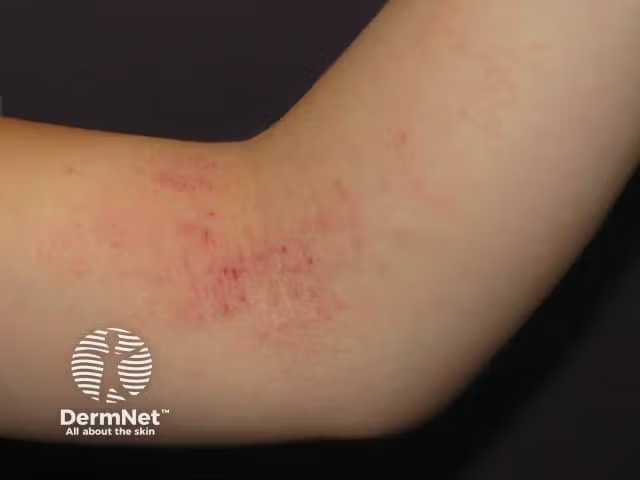- Case-Based Roundtable
- General Dermatology
- Eczema
- Chronic Hand Eczema
- Alopecia
- Aesthetics
- Vitiligo
- COVID-19
- Actinic Keratosis
- Precision Medicine and Biologics
- Rare Disease
- Wound Care
- Rosacea
- Psoriasis
- Psoriatic Arthritis
- Atopic Dermatitis
- Melasma
- NP and PA
- Skin Cancer
- Hidradenitis Suppurativa
- Drug Watch
- Pigmentary Disorders
- Acne
- Pediatric Dermatology
- Practice Management
- Prurigo Nodularis
- Buy-and-Bill
Opinion
Video
A Patient’s Experience of Atopic Dermatitis Initial Symptoms and Impact on QoL
Author(s):
Jennifer Holman, MD, FAAD, and her patient, Audrey Dean, discuss Audrey’s initial symptoms and how the disease impacted her quality of life (QoL). Jennifer Holman reflects on how her practice and approaches have changed as she learned more about the daily impact of atopic dermatitis.
Transcript
Jennifer Holman, MD, FAAD: When did you present for your skin disease?
Audrey Dean:Initially, I was going for other stuff, like HS [Hidradenitis suppurativa] [and] my psoriasis. I think that dermatitis started showing up once my psoriasis started showing up. I think it was around the same time. It was that initial itching. I was already seeing a doctor when I was…diagnosed with it…trying to get it taken care of.
Jennifer Holman, MD, FAAD:It’s interesting because way back when I was in medical school—which I can admit was [more than] 20 years ago—we were taught that you couldn’t have both…Th1 and Th2 processes. But you’re the classic patient to show that you can have some of these overlapping conditions, to where sometimes as we treat one on your skin process, we’re not treating the other and it continues to worsen. What impact would you say that your [AD] was having on your life in general, [or] has on your life in general?
Audrey Dean: When it first started getting really bad, it…impacted my mental health—how I see myself, basically. I work in a dentist office, so I’m seeing so many people every day. When it got [worse], patients were pointing out [that] I had something on my face and neck. They [would say], “What’s wrong with your face?” So that was not very fun. When [my skin] the worst, [my] mental health was the worst. Now that I’m on medication, my skin has been really clear for the past several months. I’ve definitely felt a lot better [with] how [I] look, how I feel interacting with people, [and] not having to worry about people pointing out stuff on my face. That’s been great.
Jennifer Holman, MD, FAAD: You’ve even hidden some of the facial and scalp [AD], where you were wearing a scrub cap a good bit of the time as well…. I will say, to your credit, every time you saw me, your attitude was outstanding…. [And] I think, as physicians, [this] is a key point, that [patients] are [often] putting on their best face when they see [us], because they’re not always long interactions, [so] you want to maximize those interactions. So it really wasn’t until you showed me your face, your scalp, [and] everything that was going on, [that] I could see it in your eyes. It [was] truly impacting her quality of life. As a physician, I have to do a better job intervening here [and] switch our systemic therapies. Now that your [AD] is under good control and everything else pretty much stayed quiet too, how would you say it’s impacted you daily? Was itch a big part of your story too, with your face?
Audrey Dean: It was. My face wasn’t nearly as itchy as my arms and stuff were. My arms [and legs] got pretty itchy…. I don’t think I had very much on my arms and legs, but the little that I did was itchy. I [didn’t have] to stop what I was doing for 5 minutes and try to scratch. But…sometimes it was a little harder to fall asleep because, especially at night, I felt like it got a little itchier.
Jennifer Holman, MD, FAAD: I think it’s interesting because as a physician, I have to assess the impact of [AD] on my patients, [and] I probably changed a lot of the way that I do that. As dermatologists, we’re trained to just look at the skin. If the skin is clear, then we may not be asking the questions. But I think what you said is key, that even if your skin is clear, the itch is more your quality-of-life trigger. That’s what’s impacting your daily quality of life. And so it’s not just looking at a patient and saying, “OK, I’ve got their skin better.” Especially when we focus just on topical therapies alone. We really need to focus on itch, sleep, your social interactions, your social burdens, [and those types of things]. I think I’ve evolved as our treatments for [AD] have evolved. The questions that I ask patients [have changed a little bit regarding] quality of life as opposed to just…[looking] at your skin like we do in clinical trials—look at the skin, your skin’s clear, check a box, and move on. So I do think, as we focus more and more on itch and quality of life, it changes the way I assess these patients.
Transcript is AI-generated and edited for clarity and readability.






